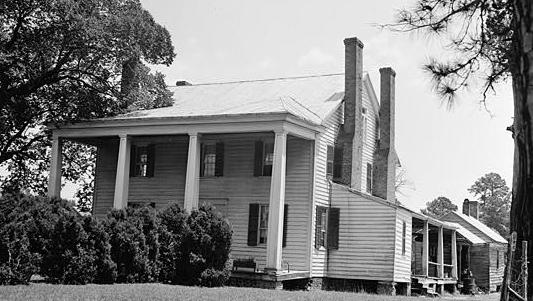Mary Elizabeth Commander
(Perquimans County)
Featured Character – Divided Allegiances

Cedar
Vale
Courtesy of the U.S. Library of
Congress, Historic Buildings Survey
Born on
July 21, 1825, Mary Elizabeth Commander came from the upper class of
Albemarle
society.
Her father’s family, the Commanders, was the largest landowners in Pasquotank
County,
and her mother’s relatives, the
Weeks, also played a significant role in the region. At the
age of two,
Mary Commander’s father, Joseph, died suddenly. Her mother,
Parthenia
Commander, quickly remarried. At the age of twelve, her
mother and
stepfather sent Mary Commander to Wesleyan
Female College,
a newly established Methodist school for women in Wilmington,
Delaware.
Three years after her 1841 graduation, Mary Commander married James
Laurence
Gatling. One of the wealthiest landowners in Perquimans
County,
by 1850 Gatling owned twenty-five slaves and over $8,000 in
property.
Although he only owned seventeen slaves in 1860, the rise of land and
slave
prices during the antebellum period drove Gatling’s estimated wealth to
$45,973
by 1860. The Gatlings
referred
to their farm as “Cedar Vale.” Their eldest son, John Gatling, attended
the University
of Virginia
and then Harvard
Law School.
Unlike other large landowners along the Albemarle
Sound,
James Laurence Gatling expressed open sympathies for the
Confederacy.
During the organized escape from the Union steamer Mable Leaf,
Mary
Commander Gatling provided food and shelter to fugitive Confederate
prisoners. Emancipation severally impacted the Gatlings’
wealth and
prestige. In 1867, the General Assembly gave a consortium
headed by Elihu
A. White and James L. Gatling the exclusive right to steamship
navigation on Albemarle Sound,
but a lack of capital doomed the
effort. By 1870 Gatling’s net worth stood less than half its
1860
value. James Laurence Gatling died on January 26, 1882.
Eventually, Mary Commander Gatling moved to Forrest City, Arkansas,
where John Gatling practiced law. She died on June 10, 1896.